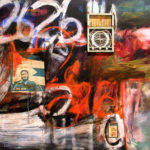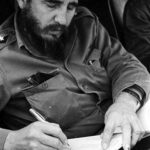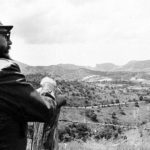CubaDebate 174
Bernard Sanders and the Ides of March

Bernard Sanders and the Ides of March
 By Ramón Sánchez-Parodi Montoto
By Ramón Sánchez-Parodi Montoto
He was appointed head of the Cuban Interests Section in the United States, between September 1977 and April 1989. He then served as Cuba’s deputy foreign minister until 1994. And from then on he served as Cuban ambassador to Brazil, until 2000. In addition to his activities as a Cuban government official, Sánchez-Parodi is a journalist and writer.
March 13, 2020
Translated and edited by Walter Lippmann for CubaNews.
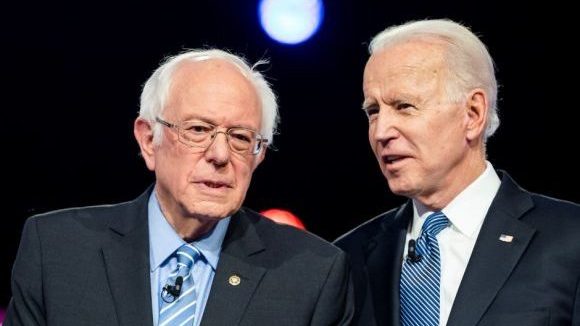
Sanders and Biden vying for the Democratic nomination.
The results of the primary on March 10 certainly point to Joseph Biden becoming, in less than two weeks, the absolute frontrunner among the Democratic contenders for the highest office in the United States. Biden is now assured of the necessary and sufficient conditions to accumulate the support of the 1,991 delegates that will guarantee him to be proclaimed on the first ballot at the Democratic National Convention (July 13-16 in Milwaukee), as the Democratic Party candidate for the presidency of the United States.
Senator Bernard Sanders, the only other contender still active in his presidential bid, has only an open arithmetic probability of accumulating the number of delegates to be nominated as the Democratic Party’s candidate. Since that option is practically unattainable, Sanders has only to give up his aspiration. Therefore, the question to be solved is how and when Sanders will give up his electoral efforts. That decision will be the result of discussions and negotiations, not necessarily public, between both campaign teams, the two challengers and the Democratic leadership.
Among the issues to be considered in these decisions is the time factor, which has begun to run since the March 10 primary results, especially in Washington and Michigan. [These are] states where Sanders was unable to repeat the magnitude of his 2016 primary victories over Hillary Clinton. This decision is important. Once it is made, it will change the pace and content of the election campaign because the cross-party confrontation will be over and the confrontation will be between the Republican Party and the Democratic Party, and particularly between Donald Trump and Joseph Biden.
Of the six states that held primaries on Tuesday, March 10, Biden won three of them by an absolute majority: Michigan (52.9%), Missouri (60.1%) and Mississippi (81%). He also won in Idaho with 48.9% of the vote and a lead of nearly seven thousand votes.
Michigan is a state in the north-central part of the country and will be one of the most disputed states next November. Sanders had won it in the 2016 primaries against Hillary Clinton, when he beat her by winning 49.68%, with a lead of about 18,000 votes. [This time] Biden beat Sanders by more than half a million votes and more than 16%. In Missouri, Biden received 60.1% of the vote against 34.6% for Sanders and a lead of about 170,000 votes. In Mississippi, a state with a very large African-American community, Biden won with 81% of the vote, which is equivalent to more than 160,000 votes.
The results of the Washington primary were disappointing for Sanders. There he had defeated Clinton in 2016 when the election was held in the form of a caucus with 72.72% of the votes. Now he won again, but by a slim margin of 0.2%. The other victory was in North Dakota, which only brings a total of 14 delegates to the National Convention. The victory (if you can call it that) was by a margin close to 14% and less than 2,000 votes ahead: By 2016 Sanders had won that state by about 19%.
With these results, the idea is gaining ground in the minds of Democrats that the goal to be achieved in the November election is to prevent Trump’s reelection, putting aside differences over the electoral agenda on issues such as health care; the establishment of a tax on the rich; the solution of the problem of the university debt; the changes in the national security system and other measures proposed by the “progressives”, “socialists”, “communists” (choose the adjective that you find most convenient and appropriate) that the representatives of the “establishment” consider “radical” and “threatening” to society.
In fact, the results of the primaries held on February 29, March 3 and March 10 are a direct effect of the fears that the dominant sectors within the Democratic Party had about the possibility that Bernard Sanders could accumulate enough delegates to be nominated as a candidate for the presidency in the elections next November. In the last two weeks, we have witnessed an incessant media campaign and political pressure on the various Democratic groups to close ranks and “stop” Sanders.
The problem for the Democratic leadership is how to make this campaign bear fruit in November by transforming it into a mass movement to express at the polls the will to prevent Trump’s re-election.
For now, we can only wait for the “dust” of this political storm to settle so that we can glimpse the future of the current U.S. election campaign.
Estaticular, the Rare Cuban “Hybrid-Owner”

Estaticular, the Rare Cuban “Hybrid-Owner”
 By Ricardo Ronquillo ronquillo@juventudrebelde.cu
By Ricardo Ronquillo ronquillo@juventudrebelde.cu
President of the Union of Cuban Journalists. Granted Juan Gualberto Gómez Award. Former deputy editor and columnist of Juventud Rebelde.
March 3, 2020
Translated and edited by Walter Lippmann for CubaNews.
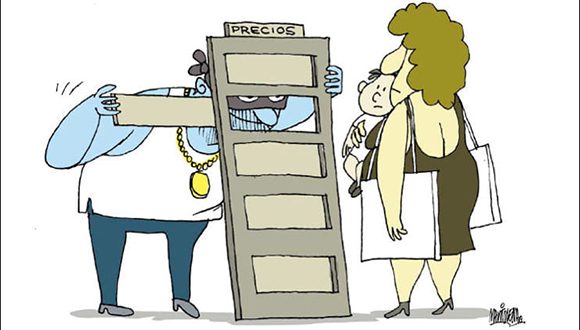
Caricature: MartIRENA
Imagine you arrive at a state-owned repair facility. You are instructed to go to the receptionist’s desk, who, in addition to taking your personal details, prepares a voucher that states in the accounting documents the type of care you will receive and the consequent cost. They then direct you to some of the repairmen present. The repairman will look hard at your appliance, the one that broke, of course, and then there will be a curious dialogue in which the repairman will tell you that for the type of damage to your appliance there are no parts in the unit… But – and this is always an interesting saving act – the repairman managed to get it, and he is ready to solve your peremptory problem.
Of course, doing so implies a “cost”, certainly much more expensive than if the “substitute” part were there in the workshop… From then on you will not end your “productive chain” within the establishment, by returning to pay for the service with the original partner who attended you, but in an intimate, very private agreement with the repairer, which will splash out to other internal confines…
Stories such as the one above gradually give shape in Cuba to a type of property that was not included in any economic or social guidelines, and therefore not in the Constitution. We are now celebrating the first year since its approval by a majority in a popular referendum. [But for this situation] there are no programmatic documents that aim at reconfiguring our socialist model.
The rationality and practical sense of the ordinary citizen has already made his baptismal act, with name included, to this curious variant of owner: “state” property [la propiedad “estaticular.] A direct and accurate friend defines it as a hybrid establishment, which in the papers are in the name of the State but, in the concrete one, a good part of the pieces and the dividends go, surreptitiously, to the pockets of its workers.
It is a secret and strange form of expropriation of public possession to which many are accustomed, by force of necessity, because otherwise, it would be very difficult for them to resolve the issues that entangle their existence.
In the recent balance sheet of the Ministry of Internal Commerce, some of the shards of this deformation jumped out. A large part of the products destined, for example, to gastronomic establishments end up being transferred to the private or cooperative sector, without fulfilling the purposes for which they were financed by the State. And the most painful thing is that this happens while the financial debts in these areas are extremely high, as much as the payments for losses to the nation’s pocket and pitiful corrupt chains.
These phenomena are more visible now, as our State tries to find its true limits. The body of that unavoidable institution for justice, freedom and sovereignty in Cuba, disproportionate for years, is giving way in size and functions.
One of the most important definitions of the so-called Updating is precisely the acceptance that the State is one thing as owner in the name of the nation and the people. Another is the various models in which property can be managed, something under discussion since the decision of the so-called “revolutionary offensive”, which turned state property into almost the entire national economic fabric, one of the “errors of idealism”, recognized by Fidel.
This definition allows for progress in the expansion of self-employment or small personal or family property-even the expected acceptance of the concept of private property, up to the scale of small and medium enterprises, the experimental opening of cooperatives in the non-agricultural sector, the handing over of idle land in usufruct, the leasing of state service premises, and the incipient purpose of transforming the socialist state enterprise, seen as the heart of the economy and of modernization.
Examples such as the one mentioned above require a more flexible and limited vision to the current circumstances, which favors the emergence of more socialized forms of property management. All of these should contribute to overcome the dragging of socialist experiences regarding the alienation of the workers from the productive processes.
Going to the causes of this fragility implies reviewing the role of the workers in the political conception of our State, for which it is necessary to cover more significant aspects, such as the issue of property and its forms of organization.
Let us not forget that the issue of property is so basic that the theorists of American neo-conservatism maintain that it is the true and crucial scenario of the decisive cultural war on a planetary scale. Not for nothing did its think tanks and its tight advertising machinery try to manufacture the ghost of a “socialist” Obama, and the same recipe now with the emerging Bernie Sanders.
Not just any trifling thing then, but our staple “hybrid-owner”.
Taken from Cubaperiodistas.
Coup Govt Seeks to Bankrupt State Airline

Coup Govt Seeks to Bankrupt Bolivian State Airline
March 3, 2020
Translated and edited by Walter Lippmann for CubaNews.

BoA workers declare a state of emergency. Photo: Radio Kausachun Coca.
Base workers of the Bolivian Aviation Company (BoA) declared a state of emergency after not being attended by the Ministry of Public Works, and asked to hold a meeting with President Jeanine Añez to learn about the situation of the state company.
The representative of the BoA collective, Francia Gonzales, expressed her fear and that of the other workers of the airline that the same pattern that occurred with the companies Lloyd Aéreo Boliviano (LAB) and Aerosur, which went bankrupt last decade, will be repeated.
“This is precisely the reason for this mobilization. Our company is gradually going into decline and this is the concern of all the workers. Many of them, former officials of LAB and Aerosur, are seeing the same steps, the same as what has happened with other companies, we are focused on the same path,” emphasized Gonzales.
This Tuesday, BoA’s president, Juan Carlos Ossio, denounced a loss of at least $50 million during the last four administrations of the Movement Towards Socialism (MAS).
“Boliviana de Aviación does not escape the logic that the country has been suffering systematically. MAS never tires of saying that it delivered an armored economy, and as we are seeing little by little, BoA is just another one of the badly managed companies that is showing a loss of more than 50 million dollars,” said Ossio.
The manager of the state-run company also considered that the rank and file workers are in a “plot”. In response to this statement, Gonzales said that the state airline workers “are not in a plot, but that the plot is coming from management” by cutting BoA’s schedule.
“At no time do we as workers intend to stop operations, that would be a plot. The plot we are seeing is from management making bad decisions in cutting routes, cutting catering and other types of services,” he added.
Claudia Mallón, a deputy from Unidad Demócrata (UD), denounced that the state-owned airline BoA failed to receive more than 79 million Bolivians (Bs) due to the reduction of frequencies as determined by the airline’s manager and the “complicit” silence of Public Works Minister Iván Arias.
Huawei Wants to Replace Google Search

Huawei Wants to Replace Google Search With Its Own Search Engine
March 4, 2020
Translated and edited by Walter Lippmann for CubaNews.

Huawei’s billboard at PT Expo, Beijing, China, October 31, 2019. Photo: Mark Schiefelbein/AP.
Replace Google Search. That is the purpose of Huawei, which is developing an Internet search engine for its mobile devices, according to the media XDA, which participated in the testing of the beta version of that application which the Chinese technology began to develop last week.
Huawei Search works as a basic search engine that helps to find websites, news, videos or images on the Internet, while offering shortcuts to consult information about the weather or currency exchange.
However, this solution is not connected to other programs, while Alphabet’s company search engine does have links to utilities such as “podcasts” or Google Assistant.
This service is operated by Aspiegel Limited -Huawei’s subsidiary in Ireland- and could work on the Chinese technology’s own search engine, without the need to incorporate external search programs.
Although at first the company invited anyone to participate in this initiative, as of February 29th it stopped the beta testing of Huawei Search because of its “concerns” related to the “misuse” of the app in social media.
The Chinese technology company has promoted this project because it cannot use certain US technology services since 2019.
It also happens that some Huawei mobiles cannot use certain Google services since last year, when the US government blacklisted the Chinese firm, preventing it from acquiring components from US companies without Washington’s approval.
Cuban Medical Collaborators in Chinese Hospitals

Cuban Medical Collaborators Resume Activities in Hospitals in China
March 1, 2020
Translated and edited by Walter Lippmann for CubaNews.

Cuban health workers in China. Photo: Cuban Medical Cooperation in China/Facebook.
Ophthalmologists from Cuba’s Medical Brigade in China have been continuing their assistance activities in three hospitals in the country since Tuesday, with responsibility and the necessary protection in the midst of the emergency caused by the outbreak of the Covid-19 coronavirus.
The mission, led by Dr. Yamira Palacios, confirmed that work was resumed after the suspensions adopted for security reasons, and as part of the national contingency plan implemented since late January.
She said in the social networks that the Cuban collaborators together with the Chinese health professionals are still linked despite the complex epidemiological situation in the country, with responsibility for their health care and protection to avoid exposure to the greatest risk.
The Brigade added that the priority is to prevent, maintain control and comply with the measures to confront the coronavirus.
This gesture is another sign of love, unity, solidarity and commitment,” she concluded.
The Cuban collaboration is developing with good results in ophthalmological centers installed in mixed hospitals in the provinces of Qinghai, Shanxi and Henan.
Official figures show that between 2012 and 2019 alone, more than 225,627 consultations and 13,546 surgeries were performed.
A couple of days ago, the Brigade reiterated its support and confidence in the efforts of the Chinese government to stop the Covid-19 in the shortest time possible. In addition, the Brigade to highlighted the discipline and compliance with the actions carried out by the health authorities of the Asian giant and those of the Cuban embassy here.
“To this day no Cuban in China has fallen ill. The result of hard teamwork. Counting on truthful and timely information without issuing a single opinion that was not supported by science, nor additional measures, without alarmism or collective panic,” he said.
She highlighted the reinforcement of the team with pediatric infectious disease doctor Ileana Alvarez and clinical infectious disease doctor Rafael Arocha. Both are recognized physicians of the Henry Reeve Contingent and whose incorporation was considered another sign of kindness and solidarity of the Cuban health system.
“We will continue on the path that will lead us to control this contagious and still unknown disease (…) that has filled the Chinese people with pain, sadness, and uncertainty,” he said.
Dr. Palacios, along with Alvarez and Arocha, are in charge of the medical post established in the Caribbean island’s embassy to reinforce health care for compatriots in China in the midst of the emergency due to the outbreak.
The team provides assistance and consultations, follows up on the current epidemiological situation, and also supports the preventive work that the diplomatic mission implemented in order to be more effective in guiding and protecting its fellow countrymen.

Cuban health workers in China. Photo: Cuban Medical Cooperation in China/Facebook.
Cuban TV Apologizes for Gay Kiss Omission

Cuban Television Apologizes for the Omission
of the Gay Kiss in the Film “Love, Simon”
March 1, 2020
Translated and edited by Walter Lippmann for CubaNews.

The film will be broadcast entirely in the same space and we will announce it to the audiences in due course. Photo: Screenshot “Love Simon”
Cuban TV apologizes to the TV audience for the mutilation of the scene from the film “Love, Simon” in the space Thinking in 3D this Saturday, February 29, where the protagonists, two young homosexuals, were kissing.
In view of this error, we want to report that the corresponding analysis is being carried out, since the omission does not respond to homophobic positions of the ICRT and its directors of TVC, as some have referred to on social networks.
The film will be broadcast entirely in the same space and we will announce it to the audiences in due course.
The inclusive vision of Cuban society pushes daily against cultural stereotypes. It is the duty of all to walk on the side of the just and to advance as the country that constitutionally recognizes “the cult of Cubans to the full dignity of man.”
On video, “Love, Simon” trailer
This note widely reproduced in the Cuban media. Examples:
http://tvcubana.icrt.cu/seccion-informaciones/4730-informacion-de-la-tv-cubana
Televisión cubana ofrece disculpas por omisión de beso gay en filme “Love, Simon”
Ernesto Cardenal on Fidel

Ernesto Cardenal on Fidel:
He is Not a Simple Character
 By Fernando Cardenal was a Nicaraguan poet and priest, one of the main exponents of Liberation Theology. Author of “Gethsemani Ky”, “Hora 0” and “Epigramas”.
By Fernando Cardenal was a Nicaraguan poet and priest, one of the main exponents of Liberation Theology. Author of “Gethsemani Ky”, “Hora 0” and “Epigramas”.
August 13, 2009
Translated and edited by Walter Lippmann for CubaNews.
Taken from Juventud Rebelde
For those of us who have known Fidel Castro (and love and admire him) it is difficult to give a brief portrait of him. Because contrary to what those who only know him from the newspapers (often hostile to him) may think, he is not a simple character to define, but a highly complex one.
Above all, it must be said that he is a brilliant personality. But he is not only a genius, but many geniuses. He was first known as a guerrilla genius. Later he proved to be a genius as a statesman, too: one of the greatest statesmen of his time, standing out from them all for having ruled for so many years with great skill, or if you like with great success, facing the greatest power in the world under such unequal conditions.
We must also add that he is a great genius of oratory, I would say that he is not only one of the greatest orators of his time but of all history. It is amazing to see how he captivates the audience, in Cuba and in any other country, speaking for hours and hours, without having the speeches written as Demosthenes did, and sometimes without even having prepared them, completely improvised.
Unlike his rivals, the presidents of the United States, who, according to Gore Vidal, cannot write their own speeches if they do not have someone to write them for them, and sometimes they cannot even read them. He is also a genius with a great deal of knowledge. He is profound in agriculture, in medicine, in economics (perhaps the world’s greatest expert on foreign debt), in electronics, energy resources, and many other things.
Gabriel García Márquez told me about the success and depth with which he analyzed in the morning a novel of his that I had just read the night before. A few years ago he decided to study Liberation Theology, of which he knew nothing. Some theologians of this tendendy have told me how he had become an expert in it. I might also add that he is great in memory: I myself witnessed how an unfinished business he had discussed with me ten years ago was taken up again when he saw me again ten years later (there being so many people he sees). He is also famous for his ability to retain numbers and to do instant mathematical operations.
As someone who has treated him personally on occasion, I can attest that he is a fascinating personality: affectionate, very soft-spoken, polite, and even tender. He is familiar with anyone from the very first moment. He is witty, witty, and always makes you laugh… All this explains why he has been an indispensable character for the people of Cuba, why he has ruled for so long (not by force of arms, because he doesn’t rule by force of arms) and why he is so popular. And also that he has the enemies that he has.
Gallery: Fidel in the eyes of the artists
Selection of paintings made by great Cuban and international artists, dedicated to Fidel Castro. This exhibition is part of the collection of the National Museum of Fine Arts.
Gallery: Fidel Castro, photos by Liborio Noval
Selection of photos of Fidel Castro taken by Liborio Noval, one of the most recognized professional photographers in Cuba. Liborio is a National Prize of Journalism and a collaborator of Cubadebate.
Nicaraguan Poet Ernesto Cardenal Dies

Nicaraguan Poet Ernesto Cardenal Dies
March 1, 2020
Translated and edited by Walter Lippmann for CubaNews.
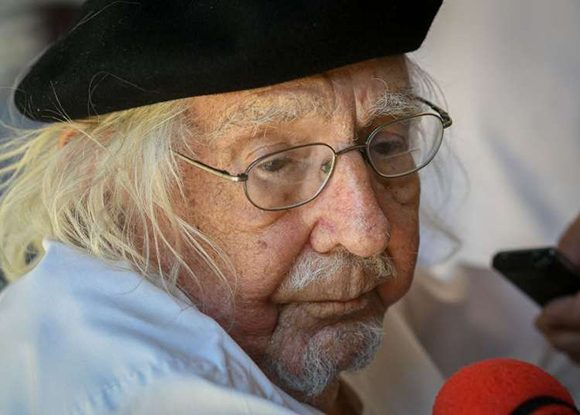
The poet Ernesto Cardenal. Photo: Confidential.
The poet Ernesto Cardenal died this Sunday afternoon in Managua at the age of 95. The priest was suffering from heart and kidney problems and had been hospitalized for a few days.
Nicaragua and Latin America are losing their greatest literary reference after Ruben Dario.
“I am a poet, a priest and a revolutionary”, was what defined the man who, in 2012, was admonished by Pope John Paul II for making a revolution together with the Sandinista Front for National Liberation (FSLN).
Cardinal, born in the colonial city of Granada in January 1925, was a poet, priest, theologian, writer, translator, sculptor and politician. His poetic work won him several international awards. In 2012 he received the Queen Sofia Award for Ibero-American Poetry. He was one of the most outstanding defenders of liberation theology in Latin America.
On February 4, 1984 -in the framework of the Cold War- Pope John Paul II imposed the suspension ad divinis (prohibition to administer the sacraments) to the priests Ernesto Cardenal, Fernando Cardenal (the poet’s brother), Miguel D’Escoto and Edgard Parrales due to their attachment to liberation theology. Thirty years later, on August 4, 2014, Pope Francis ordered that D’Escoto’s punishment be lifted, and Cardinal on February 17, 2019.
He poured his essence into his verses: the desire of women in his Epigrams, the concern about God, his revolutionary spirit in his poems against the Somoza dictatorship, his psalms, the conviction of social justice, and the famous Prayer for Marilyn Monroe.
On Monday, a mass will be held in Managua’s cathedral and the funerals will take place in Solentiname, an island in Nicaragua’s Great Lake where the writer, theologian and sculptor founded a community of peasants, painters and poets in the 1970s in support of the Sandinista Front.
(With information from La Pagina)
==================
Ernesto Cardenal: on Fidel: He is Not a Simple Character
For those of us who have known Fidel Castro (and love and admire him) it is difficult to give a brief portrait of him. Because contrary to what those who only know him from the newspapers (often hostile to him) may think, he is not a simple character to define, but a highly complex one.
FULL: https://walterlippmann.net/ernesto-cardenal-on-fidel/
Jeanine Áñez’s Campaign Stained

Drug Narcojet Arrested in Mexico Stains Jeanine Áñez’s Campaign
February 25, 2020
Translated and edited by Walter Lippmann for CubaNews.

Jeanine Áñez presides over a de facto government in Bolivia, following the coup d’état against Evo Morales last November. Photo: Rebelión.
On Tuesday, it was revealed that the aircraft arrested in Mexico last January, coming from Guayaramerín, Bolivia, belonged to the Jalisco cartel and was supposed to finance the campaign of the de facto president of that South American country, Jeanine Añez.
As soon as the complaint about the arrest of the “Narcojet” on January 28 was made public, government minister Arturo Murillo was quick to say that “the drugs were loaded in the Chapare”. Days later, in the face of the rain of evidence, he had no choice but to admit that the cocaine came from Guayaramerín, a province bordering the lands of the de facto president’s family.
“The drug was on the plane without any method of concealment. It is clear that in the place where the cocaine was taken on board, there was no control whatsoever,” a judicial source commented to the Argentine newspaper La Nación. This means that the Bolivian arm of the Jalisco cartel had the protection of the police and the army. The accumulation of evidence complicating the de facto government led former presidential minister Jerjes Justiniano to ask for the resignation of government minister Arturo Murillo.
According to the newspaper La Nación, the aircraft that took off from Guayaramerín had a U.S. license plate (registration N18ZL GLF3).
A witness revealed that the drug belonged to the Jalisco cartel and that it was supposed to finance Jeanine’s campaign. In addition, a confidential informant testified that the profits from the transaction of 1,000 kilos of cocaine destined for the United States were to cover the costs of the campaign of Jeanine Añez Chávez, a senator and current self-proclaimed president of Bolivia.
The media, whose task has been reduced to shielding (protecting) the image of the self-proclaimed, swept under the rug Jeanine Añez’s family links to drug trafficking. The self-proclaimed woman is married to Héctor Hincapié, a well-known Colombian politician who is under investigation for his ties to the Cali cartel, and is the aunt of Carlos Andrés Añez Dorado, who was arrested in Brazil with half a ton of cocaine.
(With information from Primera Línea)
Canadian First Nations on Health Coop with Cuba

Canadian First Nations on Health Cooperation with Cuba
 By Lisandra Romeo Matos and Lisandra Fariñas Acosta
By Lisandra Romeo Matos and Lisandra Fariñas Acosta
Cubadebate journalist. Degree in Journalism (2011), Universidad de Oriente. Worked at the Cuban News Agency (2011-2018).
February 28, 2020
Translated and edited by Walter Lippmann for CubaNews.
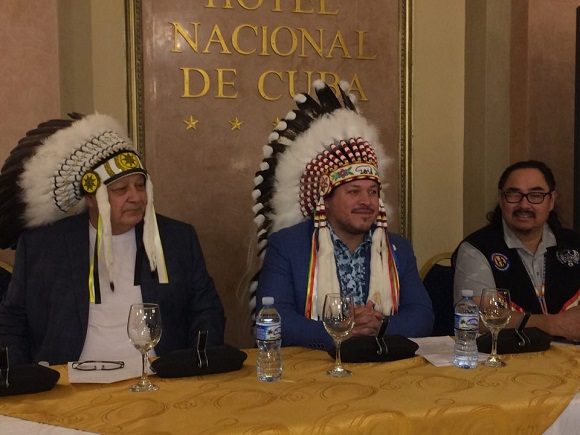
Jerry Daniels, the great chief of southern Manitoba and the Southern Chiefs Organization (centre), with chief Dave Ledoux of the Gambler Pueblo (left) and chief Nelson Genaille of the Sapotewayak Cree nation in northern Manitoba (right). Photo: Cubadebate.
First Nations leaders and health technicians from Manitoba and Alberta in Canada expressed their communities’ interest in establishing cooperation links with Cuba in the field of health.
After a week in Havana, where they toured several institutions in the sector and held meetings with authorities in the field, including the head of the country, Dr. José Ángel Portal Miranda, they announced this Friday at a press conference their growing desire that the Island be able to provide them with professionals trained in basic health services, who can attend to the needs of these for decades marginalized communities.
Jerry Daniels, the great chief of the southern region of Manitoba, and of the Organization of the Chiefs of the South, which represents 34 of the more than 600 native nations of Canada, said at Hotel Nacional de Cuba that these peoples “have been limited in their access to health care provided by the government,” and that is why they demand health care providers and various services in these communities.
He said that these communities “are in the midst of a process of transformation of care services, aimed particularly at creating and facilitating access, not only in infrastructure, but also in decision-making and training of professionals.
What we all agree on is that we need many more providers and access to health care, quality services, and professionals to assist these communities, especially in the most remote ones,” he remarked.
According to Daniels, Cuba has a structure in place and is recognized for using it, in addition to having cooperation programs consisting of sending health professionals to various nations, where they do their work with quality and contribute to saving lives even in the most difficult to reach regions.
He added that the Cuban government “can help in two fundamental aspects: sending doctors and other professionals to work in our communities to provide health services, and training specialists at the Latin American School of Medicine to return and cover existing health needs.
We are pleased to imagine that hundreds of health professionals will come to our communities and heal women, children, the elderly and other vulnerable populations. It would be a truly promising future, the native leader argued.
According to Daniel, another impact would be that by improving access to health care in these communities, in a more just and professional way, the migration of these populations to the cities in search of these services would be reduced.
“We want our communities to have health posts, hospitals and other assistance centers, and I urge the other chiefs of the first nations to open up to this possibility of collaboration with Cuba, which we need so much,” he said.
He called for accelerating the process of finding solutions to reverse existing health problems in these locations, such as diabetes, cancer, among other factors. “That is why we are here and we call on all world leaders to help us find solutions to provide better, quality health systems,” he summarized.
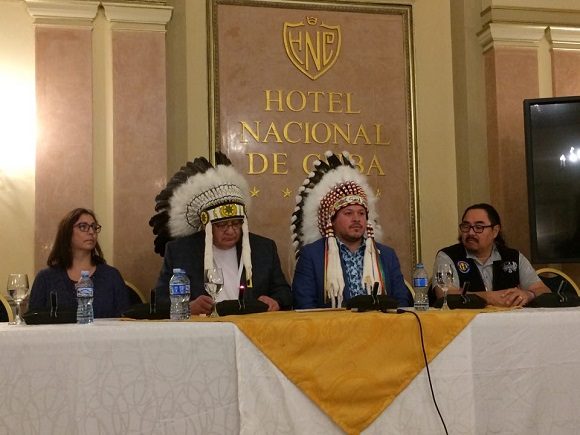
First Nations leaders and health technicians from Manitoba and Alberta in Canada. Photo: Cubadebate.
For Chief Dave Ledoux of the Gambler Pueblo, the offer from Cuba to the native peoples in Canada corresponds to the Cuban health mission around the world since 1959.
The leader highlighted the recognition of the Island’s health system by the WHO, as well as the quality and its preventive and holistic model, which has allowed to achieve minimal infant mortality rates, and to increase the life expectancy of its population.
“Thousands of students from all over the world have come to Cuba to study the different medical specialties in the last 60 years,” he pondered, and emphasized that it would be an opportune moment for this offer of help, “since we are currently rebuilding our communities to get out of decades of systemic institutional oppression.
The health philosophy of this country and its values are very similar to the traditional medicine model of our peoples, said Deloux.
The more than 600 first nations in Canada include more than one million people who would benefit from these services, he said. He added that from these initial meetings in Havana they are optimistic and hope to apply the ideas, designs and organizational strategies observed in the Cuban health system.
| M | T | W | T | F | S | S |
|---|---|---|---|---|---|---|
| 1 | 2 | 3 | 4 | 5 | 6 | |
| 7 | 8 | 9 | 10 | 11 | 12 | 13 |
| 14 | 15 | 16 | 17 | 18 | 19 | 20 |
| 21 | 22 | 23 | 24 | 25 | 26 | 27 |
| 28 | 29 | 30 | ||||



















